PTSD help: Can angling ease war vet trauma?
- Published
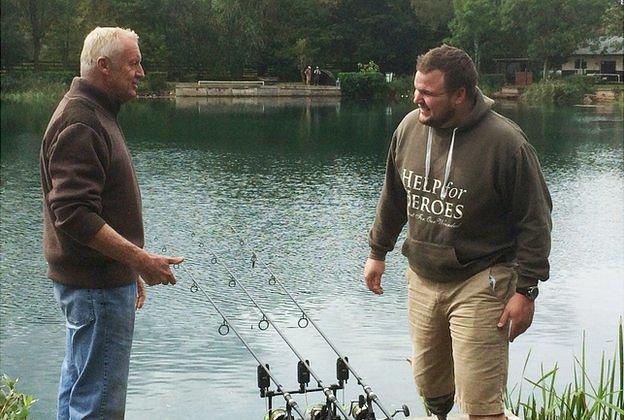
Might a fishing rod one day be prescribed to veterans suffering with post traumatic stress disorder?
The benefits of the great outdoors on mental health have long been known. But can an activity as simple as angling really improve the mental health of those scarred by the horrors of war?
Sleepless nights, flashbacks, anxiety, addiction, marital collapse - the effects of post traumatic stress disorder (PTSD) on combat veterans take many forms, external.
Diagnosis is often far from immediate, with many former service personnel suffering in silent isolation for years before seeking help, external.
And when they do seek help, the treatments offered are usually prescription drugs, talking therapies or both.
Experts say combat-related stress is a condition apart, with treatments tending to prove more successful if the healthcare practitioner is themselves ex-military, external.
So what about a completely different prescription for combat stress? How about a fishing rod?
"Wouldn't that be great?" asks Mark Wheeler, a psychologist and doctoral researcher at the University of Essex who, with other psychologists, is seeking to establish whether angling can alleviate the symptoms of PTSD.

What is PTSD?
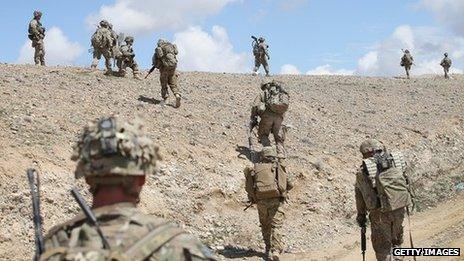
The psychological effects of war have been documented for thousands of years
A trauma is a dangerous experience that does not only expose people to threat to life or limb: it also pierces strong psychological defences to produce a state of fear, helplessness or horror
PTSD develops in response to direct exposure to a trauma but it can also be the result of witnessing or even learning about a terrifying event
Traumatic events have in common the ability to elicit intense and immediate fear, helplessness, horror and distress. They do not send advance notice that they are about to happen. This is one reason why they are so shocking. Suddenness, unpredictability, and danger have the power to traumatise
Understandably, people feel grief-stricken, depressed, anxious, guilty and angry following trauma. PTSD is a specific condition in which trauma survivors are unable to get the trauma out of their minds
Three symptom clusters are associated with PTSD: Re-experiencing symptoms in the form of distressing images, unwanted memories, nightmares or flashbacks of the trauma, the avoidance of reminders of the event, including people, places or things associated with the trauma becomes a major preoccupation and hyper-arousal, which is reflected in symptoms such as insomnia, irritability, poor concentration, being 'on guard' most all the time, headaches, muscle aches and pains, diarrhoea, nausea and increased startle responses
Source: Professor Gordon Turnbull, a consultant psychiatrist

Globally there are dozens of angling clubs for military veterans.
And Mr Wheeler, himself an angler, has no doubt fishing delivers a calming mix of pleasure and peace.
What Mr Wheeler, Dr Nick Cooper of Essex University's Department of Psychology and Prof Jamie Hacker Hughes, from the Veterans Institute at Anglia Ruskin, want to know is not only if it benefits those with PTSD but, if it does, then how and why.
Earlier this month, 11 veterans - all with PTSD and aged between 25 and 55 years old - went fishing for the weekend in Berkshire as part of the Essex universities' research.
Each was psychologically assessed before and after angling. They will be assessed again in a few days' time and then again three months from now.
One of them is Shaun Armsby, a former soldier who served with 19 Regiment Royal Artillery for six years until 1996.
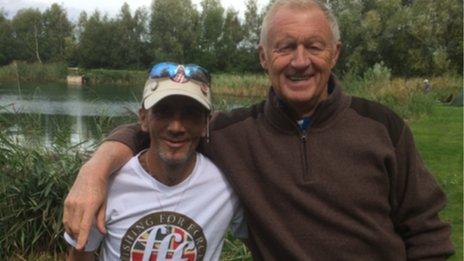
Shaun Armsby with keen angler Chris Tarrant, who visited the veterans during their weekend away
Mr Armsby, who lives on the Essex/Suffolk border, was only diagnosed with PTSD last year.
The diagnosis followed his third suicide attempt.
His PTSD relates to extensive bullying he says he suffered in the army. His first marriage collapsed and he has suffered anxiety and extreme sleep disruption (he sleeps an hour and a half a night).
Although he has received therapy and medication, Mr Armsby still struggles.
"It is extremely hard for a lot of us," he said. "You've got mayhem going through your head all of the time. You're constantly checking yourself and sometimes I have a three second memory."
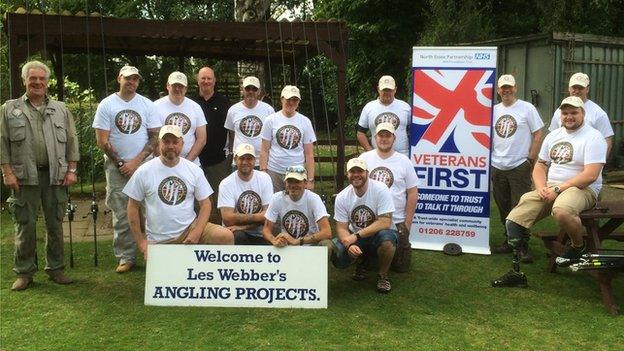
The veterans involved in the project all have PTSD and are aged between 25 and 55 years old
The pace of Mr Armsby's speech slows a little, however, at the mention of angling.
"It relaxes me. It is a break out of my bubble. There's the pleasure of just sitting at the bank," he said.
And fishing with fellow veterans provides an "informal setting" for them to talk and share their experiences.
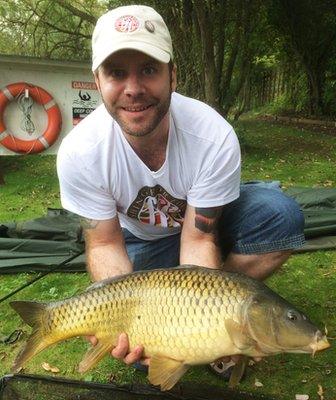
The veterans have set up their own Facebook group following the angling expedition
"Some people opened up a little bit. I could talk to people a bit about bits that happened to me," he said.
The effects of angling on Mr Armsby?
"After the fishing trip I felt great and being able to spend time with other people in my situation really does help as I didn't feel alone," he said. "They get what you go through on a daily basis and nothing you say phases them like it would a civilian."
As for the sleep, Mr Armsby managed a couple of extra hours than normal because he felt "relaxed and stress-free".
This benefit has not lasted, however, and he is again only getting an one and half hour or so at a time.
But he said: "I have felt a lot more relaxed since being home as the break did me good and I can't wait to go fishing with them all again."
'Companionship of camping'
Key to the research, says Mr Wheeler, will be whether it is the angling, the opening up to fellow veterans or both which participants find beneficial.
Mr Wheeler, who also works as a high intensity psychological therapist for Health in Mind, an organisation run by Hertfordshire Partnership University NHS Foundation Trust in partnership with the mental health charity Colchester Mind, said: "We want to see if the companionship of camping and fishing together plus being outdoors will have quantifiable effects on the symptoms experienced by military veterans with post traumatic stress disorder."
Dr Cooper said: "There is anecdotal evidence from charities working with military veterans that these kinds of activities do have a positive impact, but we want to research this in a structured way."
The veterans involved in the study have already set up their own social media group and plan on staying in touch regardless of the outcome of the research.
"To be able to talk with people with similar experiences is of benefit in itself," said Mr Wheeler. "They really, really enjoyed it. The setting up of this (social media) group is excellent.
"We want to know what elements of it have worked or whether the outdoors and angling in a group works holistically, with all the different elements together.
"We want to know what aspects they enjoyed and whether angling in a group can be used as a therapeutic tool."
Depending on the outcome of this initial research, funding for a larger-scale and more in-depth project might be sought.
- Published3 April 2014
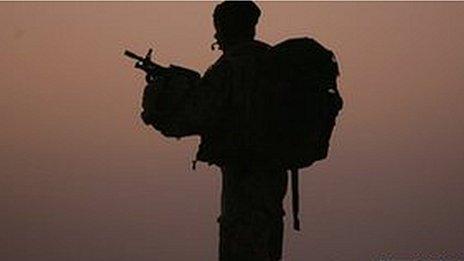
- Published12 October 2013
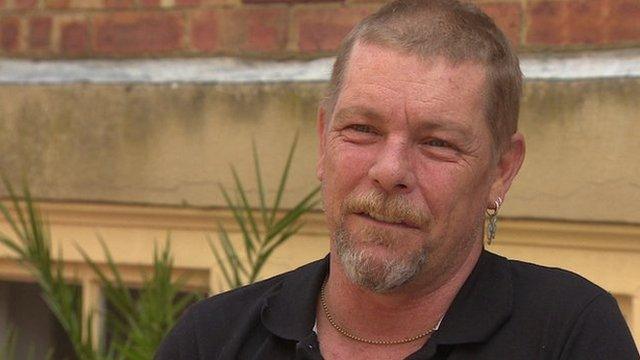
- Published13 March 2013
